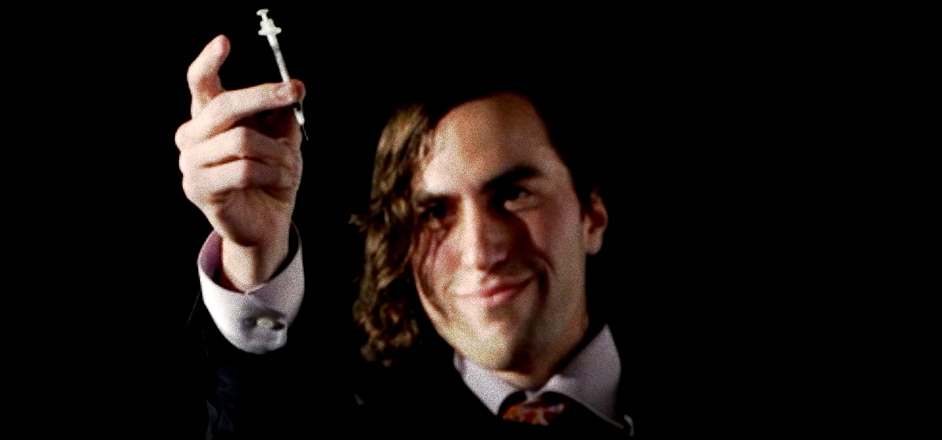This past Sunday, April 29, notorious biohacker Aaron Traywick, 28, was found dead in a sensory deprivation tank.
Biohackers are innovators who use technology to “hack” the body and help humans overcome their natural limitations. Traywick was a biohacker and self-experimenter who refused to let government regulations get in the way of his work. He became famous for making bold medical claims — announcing he had the “cure” to herpes, HIV and aging, and publicly injecting himself with his untested treatments. Critics called him reckless.
“We don’t care what the press says, what the academic community says, or what the governments around the world say,” Traywick told Rooster just weeks before his death. “The means to getting the cure don’t matter to us.”
Despite their ambitious optimism, Traywick’s half-baked proclamations were creating a major rift in the biohacking community, even among his friends.
“He was a shady, scammy guy,” Rich Lee, a former friend and business partner of Traywick’s, tells us. “He ripped off my friends, ripped off his old partners, and was ripping off the public.”
Traywick’s death and the cataclysm of suspicious events leading up to it instantly inspired a wave of conspiracy theories nearly as rich as the Kennedy assassination and the Moon Landing. Did he fake his death and flee the country? Was it a hit called by Big Pharma or fellow biohackers? Was it a suicide?
Lee’s immediate assumption: Traywick isn’t dead — he just took everyone’s money and skipped town.
“He always seemed so reckless with his company,” Lee says. “At some point, I knew he was either going to flee the country or end up in jail.”
Traywick was CEO of Ascendence Biomedical, an experimental medicine company. Like most other biohackers, Traywick and his employees believed that government regulation is way too slow, so they skirted the system. They experimented on themselves with do-it-yourself gene editing therapies.

However, Traywick quickly turned his own investors and employees against him. “Originally, he had all these other partners. They were really professional people from all over the world, and he was supposed to issue all of those people shares. But he screwed them all over. They say, ‘he ripped us off, he never gave us any stock.’”
After Traywick lost his shareholders, his employees were next to go. He’d announce unrealistic deadlines to the media, and then put pressure on his researchers to cut corners on science in order to meet those deadlines. He’d publicly call their products “cures,” a medical claim that was bound to get them crucified by the FDA. He created employee contracts that overpromised profits, assuming they would never compare their agreements, and then refused to re-negotiate those impractical contracts.
The biohacker community was growing extremely angry with Traywick. Nearly every insider agreed he was a stain on their movement. This resentment inspired another conspiracy theory about his death — that fellow biohackers killed Traywick.
“Right after he died, lot of people were coming to me asking, ‘Was it one of you guys? Was this a hit?’” Lee says. “It felt so gangster.”
Of course, Traywick wasn’t murdered by a gang of nerdy garage researchers. They hated his theatrical behavior, irresponsibly inflating his company’s advancements and throwing around the “c-word” (cure) — but they agreed with his ideas, that people should have the freedom to experiment on themselves, and that DIY research could be the key to major medical advances.
However, there is one powerful institution that fundamentally disagrees with Traywick and the rest of the biohacking community: Big Pharma.
Traywick’s death also roused the conspiracy that Big Pharma had him killed. Perhaps they were threatened by Traywick’s advances. Perhaps they were infuriated by a company that didn’t feel compelled to play by the FDA’s rules.
Addressing these suspicions, Lee says, “Nah … Aaron wasn’t actually doing any of the work. If they wanted to end the projects his company was working on, they would’ve come after the researchers.”
Plus, police investigating the cause of Traywick’s death say the evidence doesn’t suggest foul play. No one hired a hitman to get rid of the dude.
The most probable of all the theories: Traywick died of a drug overdose. Sensory deprivation tanks are a popular drug experience, so it’s not unheard-of that someone could OD inside a float tank. Still, the question remains unanswered, was it an accident? Or could it have been intentional?
“My second thought, after my immediate assumption that he’d ripped everyone off and fled, is that if he really is dead, it was a suicide,” Lee says. He points out a few fishy circumstances.
“Aaron was suing a few friends and media outlets for defamation, but two weeks before his death, he dropped all the lawsuits. Then, he had a deadline coming up in a couple of days, one that there was no way in hell he was going to make,” he says.
It’s possible that all of Traywick’s swindling and lies had finally caught up with him, and he needed to find a way out. Until police confirm a cause of death, everyone Traywick knew is left with a sense of unresolved uncertainty.
As Lee explains it, “The circumstances of his death are going to influence the way I resolve this in my head as far as what’s the moral of his story.”




Leave a Reply